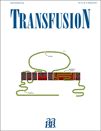Characterization of Jk(a+weak): a new blood group phenotype associated with an altered JK*01 allele
This work was supported in part by the Swedish Research Council (Project K2008-71X-14251), governmental ALF research grants to Lund University Hospital, the Medical Faculty at Lund University, Region Skåne, and the Vårdal Foundation.
Abstract
BACKGROUND: The clinically important Kidd (JK) blood group system is considered to be relatively uncomplicated, both serologically and genetically. The JK*01 and JK*02 alleles give rise to Jka and Jkb antigens, respectively, and silenced alleles result in Jk(a−b−). Other inherited variants analogous to Fyx and weak D phenotypes have not been characterized for JK, although recent abstracts indicate their presence.
STUDY DESIGN AND METHODS: Six index samples from individuals whose RBCs reacted variably or weakly with different sources of anti-Jka and 300 controls of the four known JK phenotypes were investigated by standard serology, flow cytometry, Western blotting, and the urea hemolysis test. Molecular analysis, including allele-specific polymerase chain reaction (PCR), DNA sequencing, and transcript analysis by real-time PCR, was performed.
RESULTS: All Jk(a+wb−) and Jk(a+wb+) index samples were homo- or heterozygous for an altered JK*01 allele carrying 130G>A (Glu44Lys) and the JK*02-associated silent SNPs 588G and Intron 9 –46g. Blood donor screening indicated an allele frequency of 0.042. Titration and flow cytometry with anti-Jka gave lower values in index samples compared to controls, as did anti-Jk3 titers. Donors with 130A also showed significantly decreased Jka density by flow cytometry versus 130G. Western blotting with anti-UT-B demonstrated weaker reactivity with Jk(a+w) membranes while JK mRNA levels could not discriminate index samples from controls. The urea hemolysis test was only moderately affected in two Jk(a+wb−) samples.
CONCLUSIONS: A new phenotype with weakened Jka expression on RBCs is associated with a JK*01-like allele, which may constitute a risk for hemolytic transfusion reactions if antigen-positive units are missed by routine serology.




